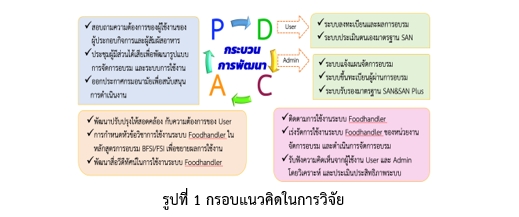Food Sanitation management on digital technology Foodhandler
Keywords:
การสุขาภิบาลอาหาร, ระบบเทคโนโลยีดิจิทัล, ระบบ Foodhandler, สถานที่จำหน่ายอาหารAbstract
This research is Action Research. by applying the PDCA process to develop digital tools for food sanitation management in accordance for ministerial regulation hygiene for food establishment B.E. 2561 (A.D. 2018). The population and sample consisted of business operators, food handlers, and training management agencies in accordance with the ministry of public health Announcement on the criteria and methods for training business operators and food handlers B.E. 2561 (A.D. 2018). The study has 4 stages: (1) study the situation of training management for food business operators and food handlers and hygiene management of “food establishment”. (2) Development of appropriate food sanitation management models under the new normal way of life and digital society to drive the ministerial regulation hygiene for food establishment B.E. 2561 (A.D. 2018). (3) Monitoring and evaluating food sanitation management models using digital technology tools and. (4) Continuous review and development to provide recommendations for the Foodhandler digital technology food sanitation management system. Data were analyzed using descriptive statistics and content validity was checked.
The study results show that food sanitation management is based on the Foodhandler digital technology system in driving ministerial regulation hygiene for food establishment B.E. 2561 (A.D. 2018). It was found that the registration system for training management agencies was established and there were 2,146 users, most of whom were local administrative organizations (1,916 users). There were 842,677 registered business operators and food handlers, of whom 764,001 (90.6%) completed the training when analyzing the data trends over the past 3 years, it has increased. The results of the evaluation of the usability found that Foodhandler system users were very satisfied overall (84.4 %), with the highest level being the use of data in the area at 89.84 %. and extending to the development of business operators to evaluate themselves and apply for certification through the standards, totaling 12,465 users. However, when tracking and analyzing data in the system, it was found that the issues that need to be continuously developed are food vendors who have undergone training but still do not pass the personal hygiene standards. In particular, the issue of personal hygiene of food handlers that needs to be improved the most out of all the requirements in the standard (6.40 %). This reflects the effectiveness of the training that is still unable to change the hygiene behavior in food sanitation work of business operators and food handlers. Therefore, there is a proposal that needs to be reviewed and the training format developed that results in trainees changing their behavior in food work correctly.
References
Best JW. (1977). Research in Education (3rd ed.). Englewood Cliffs, New Jersey: Prentice Hall.
Van Seventer, J. M., & Hamer, D. H. (2017). Foodborne diseases. In S. R. Quah (Ed.). International encyclopedia of public health (pp. 160–173). Amsterdam: Elsevier
World Health Organization. (2015). WHO estimates of the global burden of foodborne diseases. Geneva: World Health Organization. Available at: [Online] Retrieved August 16, 2018 from: https://www.who.int/foodsafety/publications/foodborne_disease/fergreport/en/
กองระบาดวิทยา กรมควบคุมโรค. (2565). สรุปรายงานการเฝ้าระวังโรค Annual Epidemiological Surveillance Report 2023.
ปัญจ์ปพัชรภร บุญพร้อม, อินจิรา นิยมธูร,สิทธิพันธุ์ ไชยนันทน์ และบุญส่ง ไข่เกษ. (2560). การประเมินมาตรฐานสถานที่จำหน่ายอาหารกรณีศึกษาโรงอาหารวิทยาลัยเทคโนโลยีสุขภาพและบริการ กรุงเทพฯ. วารสารวิจัยรำไพพรรณี, 11(2), 177-87.
พรสุดา ผานุการณ์, พีระยา สมชัยยานนท์ และ อาภาพร รุจิระเศรษฐ. (2564). เปรียบเทียบสุขลักษณะของร้านอาหารที่มีผู้สัมผัสอาหาร ผ่านการอบรมหลักสูตรการสุขาภิบาลอาหารของกรุงเทพมหานครด้วยวิธีการอบรมในห้องอบรม (Class room) และ วิธีการเรียนรู้ด้วยตนเอง (Self-study) ในพื้นที่กรุงเทพมหานคร. วารสารสาธารณสุขมหาวิทยาลัยบูรพา, 16(2), 136-148
วิชัย ชูจิต. (2551). ปัจจัยที่มีอิทธิพลต่อการปฏิบัติตามมาตรฐานด้านสุขาภิบาลอาหารของผู้สัมผัสอาหารในร้านอาหารจังหวัดพังงา (ครุศาสตรมหาบัณฑิต). สาขาการส่งเสริมสุขภาพ, บัณฑิตศึกษา : ภูเก็ต : มหาวิทยาลัยราชภัฏภูเก็ต.
สถาบันโภชนาการ มหาวิทยาลัยมหิดล. (2562) การพัฒนารูปแบบการจัดการอาหารริมบาทวิถีเพื่อเสริมสร้างสุขภาพ. สมุทรสาคร: ไซเบอร์พริ้นท์กรุ๊ป, 2562
สำนักสุขาภิบาลอาหารและน้ำ กรมอนามัย กระทรวงสาธารณสุข. (2556). คู่มือวิชาการสุขาภิบาลอาหารสำหรับเจ้าหน้าที่. พิมพ์ครั้งที่ 2. กรุงเทพฯ: โรงพิมพ์ศูนย์สื่อและสิ่งพิมพ์แก้วเจ้าจอม, 2557
สำนักสุขาภิบาลอาหารและน้ำ. การเฝ้าระวังสถานการณ์สุขาภิบาลอาหารในสถานประกอบการด้านอาหารประจำปี 2558. (2558). [สืบค้นเมื่อวันที่ 9 มีนาคม 2564] จาก: https://foodsan.anamai.moph.go.th/th/food-sanitation/204381

Downloads
Published
How to Cite
Issue
Section
License
Copyright (c) 2025 Journal of Health Promotion and Environmental Health Research Health Promotion Centre 8 Udon Thani

This work is licensed under a Creative Commons Attribution-NonCommercial-NoDerivatives 4.0 International License.





